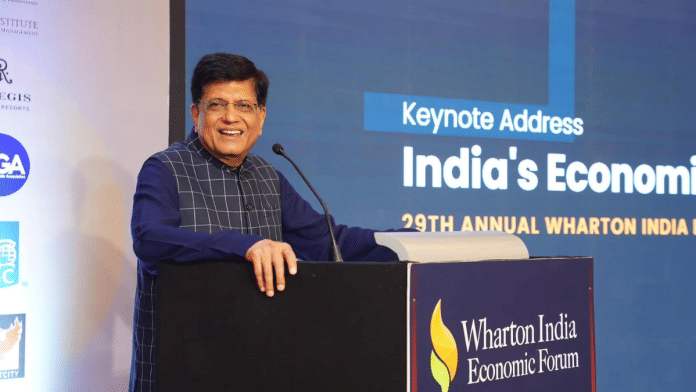New Delhi: India’s growth has been due to the government’s focus on reform, innovation, sustainability, and inclusion, said Union Minister of Commerce & Industry Piyush Goyal at this year’s Wharton India Economic Forum (WIEF).
At the event on 12 January, partnered by ThePrint, Goyal emphasised India’s transformative journey and ambitious vision for the future. He invoked Swami Vivekandanda’s timeless call to action: “Arise, awake, and do not rest until your goal is met.”
A central theme of the address was the “5 Ds” driving India’s success and economic vision: decisive leadership, demographic dividend, demand, democracy, and diversity, Goyal said.
“These five elements will propel India from a $4 trillion economy today to a $30-35 trillion economy by 2047,” he added at the WIEF – Wharton’s student-organised conference that focuses on India’s business landscape. It is the country’s largest student-run conference.
Chairman of The Global Education & Leadership Foundation Shiv Khemka emphasised leadership, global responsibility, and India’s unique role in shaping the future – “India is at a very critical moment in its history”.
Khemka spoke of his global journey, from his roots in India to his experiences across continents, which shaped his perspective on interconnectedness. Highlighting global challenges like climate change, refugee crises, and geopolitical tensions, he urged collective action: “The world has enough for everyone’s needs, but not enough for our greed,” he said, quoting Mahatma Gandhi.
While underscoring the transformative power of technology, including AI and quantum computing, Khemka, however, cautioned against focusing solely on the elite, noting that after his travel around Silicon Valley, “there had been no discussion at all about 80 percent of the planet that doesn’t have all the things we have”.
India’s G20 sherpa Amitabh Kant shared his insights on the “forward-looking vision for India,” how he believed India could grow into this vision, and his views of nation branding, soft power, public-private partnerships and structural reforms in being critical to this mission.
Kant stressed on the importance of governance, competition and data as crucial pillars that India’s growth story relied on, adding that manufacturing was a key industry critical to India’s growth.
He also invited the audience to consider the sheer scale of India’s domestic market as well as the key value propositions it offered to tourists domestically as well as internationally.
There were several panel discussions at the event. The technology panel spoke about unique innovations from India – not making clones of foreign companies) – weighing in on infrastructure, customer acquisition cost, and regulation.
The future of media and advertising was also explored by industry leaders, who said the landscape was undergoing a seismic shift. The discussion revolved around the dynamic nature of media, evolving consumer behaviour, and evolving monetisation models between legacy and digital platforms.
The panel on energy and climate debated whether India would achieve the 20 percent ethanol blending target and the future of India’s renewable energy landscape, concluding that India was on the brink of a massive opportunity in the energy sector. While growth has been evident in the last decade, the real potential was yet to be unlocked, the panelists agreed.
A consumer panel discussion explored emerging trends, challenges, and opportunities in the Indian consumer market. Industry leaders and experts shared their insights on consumer behaviour, market strategies, and innovation.
The panel concluded with actionable insights on creating consumer-centric strategies, leveraging hyper-local opportunities, and fostering innovation. The discussion reinforced the importance of staying close to the consumer to build lasting and impactful solutions.
The panel on investment explored the key drivers shaping India’s investment landscape, opportunities for growth, and strategies to maximise impact while navigating challenges in a rapidly evolving economy.
The panelists said India, with its vast market potential and demographic dividend, had become a focal point for global investors.
This discussion shed light on the role of private equity and venture capital in shaping emerging sectors, opportunities in green finance and sustainable investments, and public-private partnerships and their influence on infrastructure and economic growth.






